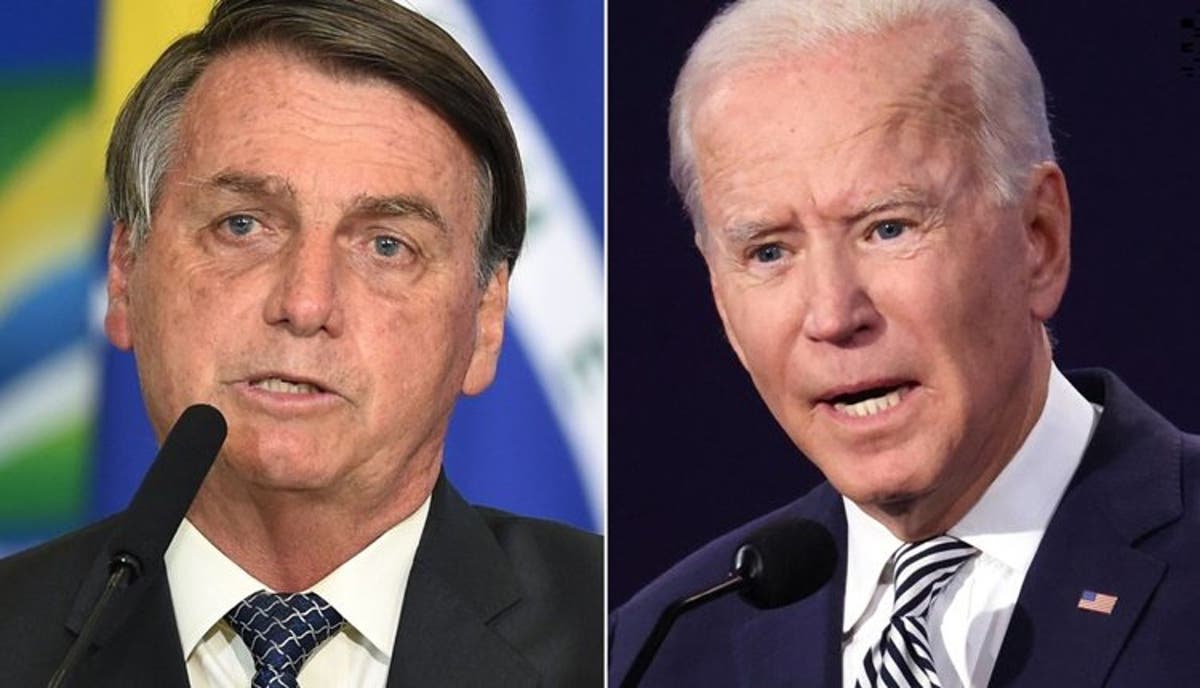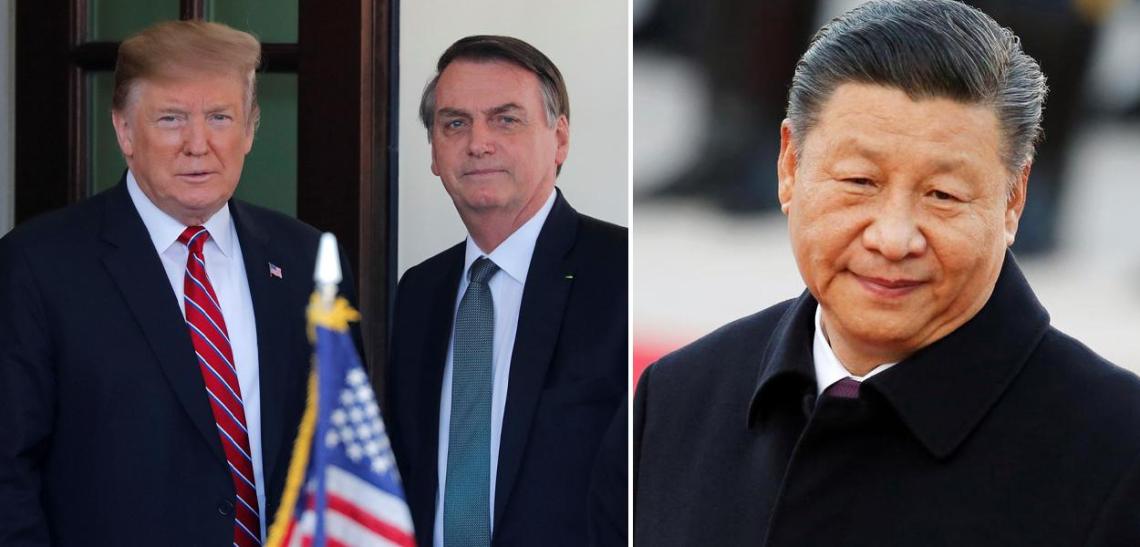RIO DE JANEIRO, BRAZIL – A bucket of cold water for the presidential family cheerleaders. Joe Biden’s victory, announced on Saturday, is indigestible to President Jair Bolsonaro and his sons, who were already supporting Trump 2020 long before the election.
The Brazilian President loses a decisive ally in the power of the United States, at a moment when he opened a pandora’s box in his relationship with China. Until Sunday afternoon, the Brazilian President had not spoken out about the Democrat’s victory, becoming one of the few heads of state to remain silent at such a symbolic moment for the world. He preferred to be cautious until he understood if Trump’s legal challenges would stand up, point out journalists who cover the Planalto Palace.
It is a difficult moment for Bolsonaro, who had in Trump an asset and an endorsement of his government style. The Republican, and his central position in geopolitics, helped normalize Bolsonaro’s historical diversionism with an attack on institutions, journalists, and advances in the moral agenda, an unprecedented break in the democratic pact that Brazil sealed in 1988.

“It is undeniable that the global environment that President Trump created is very beneficial for Jair Bolsonaro’s project,” says Oliver Stuenkel, coordinator of the graduate studies program of the Getulio Vargas Foundation’s School of International Relations. Both Trump and Bolsonaro follow the anti-science, conservative, and confrontational rhetoric, which now hangs suspended.
With Biden as president, the Bolsonaro government is forced to reinvent its foreign policy in light of its trade relationship with the United States, Brazil’s second-largest partner. Biden has already started to mark his style, asking on Saturday for cooling down the climate that dominated his country under Donald Trump’s leadership.
In his speech recognizing his victory, he listed the battles ahead, such as the control of Covid-19, the economic rebound, and the “battle to save the climate,” he said, underscoring his concern to rebuild the social fabric and uphold democracy. “It’s time to set aside the harsh rhetoric. Lower the temperature, to look at each other,” Biden said. “It’s time to heal America.”
Last Friday, the President of Brazil signaled that he had sensed the winds of change. At an event in Florianópolis, in the south of the country, he mentioned Trump’s name. “I’m not the most important person in Brazil, just like Trump is not the most important person in the world, as he says so himself. The most important person is God, humility must be present among us,” he said.
But this Saturday’s silence made it seem that the transition of American power is still being absorbed within the Government. “With the change in power, Bolsonaro loses the master pillar of his foreign policy,” says Rubens Ricupero, former Brazilian ambassador to the United States. “This pillar is now crumbling,” he explains.
The new dialogue is tricky for the Bolsonaro government, hostage to its own rhetorical base. Lowering his guard to Biden means accepting the need to reverse the positions that have so far sustained him, starting with environmental policy, which is extremely dear to the incoming Democrat president.
Although Biden’s priority agenda is the pandemic and the economy in his country, the environment is an interest that affects Brazil. In this case, the Brazilian executive cannot escape an alignment change. “Brazil is not China, but it is a calling card for Biden to show a change in global alignment,” says Fabricio Ponti, Ph.D. in political philosophy.
However, the convergence will need to overcome a disturbance in the relationship with Biden, since he discussed the Amazon in a debate with Trump in late September. “The tropical forest of Brazil is being devastated,” said Biden, stating that if elected, he would unite other countries to guarantee US$20 billion (R$100 billion) for the preservation of the Amazon.
“Stop destroying the forest and if you don’t stop, then you will face significant economic consequences,” he added. Then, at another event, he again addressed the issue, saying that there could be “sanctions”.
Bolsonaro did not appreciate it and complained at the time. On Wednesday, November 4, he mentioned the incident. “The Democratic candidate has twice mentioned the Amazon. Is that what you want for Brazil? Indeed, this is interference from abroad”, he said. Bolsonaro criticizing the press for its favorable projections for Biden, which suggests the absence of a scenario that would rely on his victory.
“The Government doesn’t know how to act with diplomacy, it is belligerent,” says Ricupero, who points out the Itamaraty as one of the instruments of a policy that contradicts diplomacy. “It’s a terrible group, and unfortunately the Foreign Minister [Ernesto Araújo] is even worse,” says Ricupero, who mentions a recent event at the Rio Branco institute in which the Foreign Minister said he was proud to be considered a “pariah of the world” and to be isolated.
It is against this backdrop that the Bolsonaro government needs to build bridges, and restore the country’s reputation. Brazil is in decline in the international community after the increased deforestation of the Amazon and Pantanal, ongoing hostility toward China, and the President’s erratic leadership in managing the Covid-19 pandemic. But if the world called Brazil a “pariah,” Trump was there to comfort or praise the Brazilian president on Twitter. It was an important rebound for difficult moments, like in August 2019, when the world pointed its finger at Bolsonaro for the fires in the Amazon.
“I got to know President Jair Bolsonaro well in negotiations with Brazil. He is doing a very hard job fighting the fires in the Amazon and he is doing a great job for the people of Brazil,” wrote Trump, recalling that “he [Bolsonaro] and his country have the full and complete support of the United States!”
With Biden’s victory, the Brazilian President sees this blatant support evaporate and is left without a powerful backing for his anti-system and anti-communist narrative, which inflames his followers and maintains Bolsonarists united. “Either he [Bolsonaro] adapts to this new situation, and this will alienate him from his far-right base in Brazil and from abroad, or he will clash with Biden. Which is not impossible either,” says leftist Celso Amorim, ex-Minister of Foreign Affairs under Lula and Minister of Defense under Dilma.
To enter a collision course with the United States would be a shot in the foot at this time when Brazil needs loans and investments from the international market. According to Ricupero, there is an opportunity to review the position adopted by the Bolsonaro Government in foreign policy thus far.
“On Biden’s side, there will be no antagonism or hostility towards Brazil. He values alliances and knows Latin America very well,” he says, recalling that he was twice president of the U.S. Senate Foreign Relations Committee. The question is whether the President will understand the message. “This was an opportunity for [the Government] to re-examine things and to make progress. But I don’t know if that will happen,” says Rubens Ricupero.

Bolsonarism rattled
While Bolsonarism is overwhelmed by the U.S. election result, Biden’s victory provides a shot of encouragement to the President’s opponents. “The Democratic Party’s more progressive camp implemented broad front tactics when campaigning for Biden. They saw the extent of the danger that Trump represents and assessed his tremendous strength. Lessons for interpreting the Brazilian reality and for defining how to change it,” wrote the governor of Maranhão, Flávio Dino (PCdoB – Communist Party of Brazil), on his Twitter last Friday.
Ex-ambassador Rubens Ricupero sees an important backlash for populism, heightened by the pandemic. “In general the pandemic did not favor populists,” although he recognizes that the victory was tight and that Trumpism will continue. “There’s no doubt that the populist movement is weakened, it took a blow,” he says. “It doesn’t mean that they will end overnight,” he adds.
However, political scientist Andrei Roman, of Atlas Político, notes that Trumpism is far from becoming invisible in American society, a warning to those who believe that Bolsonarism may subside from now on. “This is a cultural process, not only an electoral phenomenon. It is typical of right-wing populism that explains the resilience of several leaders, both in Hungary and Brazil,” he says.
“There was an expectation that Trump would lose badly and he almost won,” adds Roman, recalling that the Republican won more votes from blacks, Latinos, and poor in the history of the Republican Party.
But if Trump’s rise inspired populists, his defeat will inspire many who intend to defeat candidates and politicians like him, notes Oliver Stuenkel, mirroring the case of Bolsonaro, or Erdogan, in Turkey. “There are many useful lessons. We will learn a lot on how to govern a country after a populist has done some damage. Biden will reinvent the center,” he projects.
Christopher Garman, director of the risk analysis consultancy Eurasia, points out that both Bolsonaro and Trump are the fruit of a successful electoral and political strategy that exploits an anti-system feeling in the world.
“If you look at opinion polls in Brazil or the United States you see that what enables this policy is the tremendous degree of distrust [of the people] in most institutions in the so-called system: the media, the judiciary, political parties, leadership and anger over the rules of the game,” he notes.
Individuals like Bolsonaro and Trump, Garman explains, can only be elected because of this chronic distrust of the electorate. “It is not Trump losing that will draw strength from this movement in Brazil. The foundations of Bolsonarism remain,” he adds.
Fabricio Ponti, also a specialist in international relations, takes a similar approach. “We can’t think it’s a wave that comes and goes. Bolsonarism is not going to end, not with Senator Flávio Bolsonaro being indicted this week for salary kickbacks at the Rio Assembly, nor with an impeachment. These anti-system feelings will persist,” he says.
However, the picture now requires more precise calculations, given that the country’s economy is staggering because of the pandemic. “Brazil’s position is far from comfortable, with the economy faltering,” Ricupero says. The diplomat recalls that Brazil needs investments, loans, and markets for its products. “Isolation causes all this to be lost,” he alerts. At a time when the world is experiencing a change of power in the United States, Brazil is searching for its place.
Source: El País

